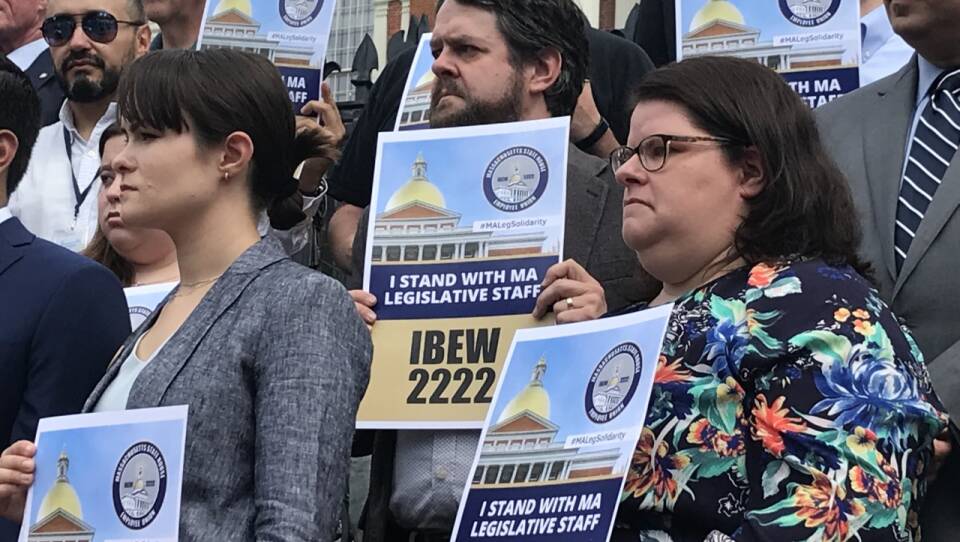Supporters of a nascent union for State House staffers sharply criticized Senate President Karen Spilka in an outdoor press conference Wednesday morning, saying her lack of support for their efforts calls both her and the Senate’s commitment to organized labor into question.
“Let me be absolutely clear: The Senate president can prove [the Senate] is a champion of labor today by announcing its support for the Massachusetts State House Employee Union,” Senate staffer Tara Wilson said, prompting applause and cheers from a crowd gathered in front of the building.
“The Senate has a once-in-a-generation moment to create a sustainable workplace legacy for State House staffers,” Wilson added. “We are asking the Senate President: Join us this [legislative] session,with the best interest of the Senate and the commonwealth in mind. Bargain with us. Move forward in partnership with us.”
Mike Monahan of the International Brotherhood of Electrical Workers, which is representing the new union, offered a more cynical assessment of the Senate’s refusal to back its efforts.
“Listening to them as they seek endorsements, and [tell] local unions how pro-union they are and how their father, grandfather and everybody under the sun was a union member … and then to see so many of them sit on the sideline as workers, their workers, try to just collectively bargain, it’s actually comical to watch,” said Monahan, an IBEW international vice president. “It’s sad to watch them. But at least their true colors come out.”
The IBEW also represents legislative staffers in Oregon, who became the first such group in the country to unionize last year.
Mark Martinez — a former Senate staffer and cofounder of the group Beacon BLOC, which advocates for an anti-racist cultural shift inside the State House — also raised the specter of hypocrisy in his remarks.
“A few years ago, when the Senate passed a bill in response to the disastrous [U.S. Supreme Court] Janus decision that attempted to gut public sector unions, the Senate president was quoted as saying, 'Public workers are the backbone of our economy and deserve the ability to fight for fair wages, access affordable healthcare, and work in safe conditions,'” Martinez said. “Well, I can tell you that is certainly one area where me and the Senate president absolutely agree. And if she truly believes that, then there is only one option: Meet with these courageous staffers, voluntarily recognize the union, and be the champion of organized labor you have promised to be.”
The push to unionize State House staffers has been brewing for several years, driven by a desire for improved wages and benefits and also a widespread sense that, for many legislative employees, the workplace climate can be negative or even toxic.
While Senate staffers asked Spilka to voluntarily recognize the Massachusetts State House Employee Union three months ago, organizing efforts in the House are less advanced.
At Wednesday’s rally, though, House aide Ravi Simon said their efforts are progressing — and that could help make the State House a more diverse, inclusive representative workplace than it currently is.
“It’s more than uncomfortable that I usually find myself the only person of color in the room in the building behind me,” Simon said. “We need a union to help curb the worst excesses of a workplace that still lacks an independent HR department, an equal-opportunity officer, or day 1 comprehensive training for staff.”
Simon added that while he loves his job, he’s often agonized over the personal sacrifices it requires.
“When I make plans for my future, I realize that I won’t be able to do things that I dream of, like buying a home or starting a family," he said. "… Staff retention is awful in the building, which makes the State House a pipeline to lobbying organizations. That loss of institutional memory is bad for our democracy and the constituents that we serve.”
A Beacon BLOC survey of legislative staffers released in May 2021 found deep dissatisfaction with working conditions at the State House, with most staffers saying they were not fairly compensated and 16% saying they have experienced food insecurity.
That survey said legislative aides typically make about $43,000 annually.
Spilka has taken some steps aimed at alleviating staffers’ concerns. While new staffers are not eligible for health insurance coverage until they’ve been on the job for two months, the current Senate Budget proposal would provide it within the first month of employment. Spilka also announced a compensation boost of at least 10% this month, and rolled out a more generous parental-leave policy last year.
At Wednesday’s rally, though, supporters of the union drive said the improvements they’re seeking should be established contractually rather than meted out selectively. They also suggested that Spilka’s reticence is out of step with the current political zeitgeist.
“The worst public-health crisis of our lives has prompted many nurses and healthcare professionals to organize together for positive change,” said Massachusetts Nurses Association President Katie Murphy. “The same is true for workers across industries from Amazon to Apple stores to Starbucks.”
While existing state law doesn’t explicitly give legislative staffers the right to unionize, Wilson, who is an attorney, said after the rally that this shouldn’t preclude Spilka and the Senate as a whole from acting.
“We could do something like the U.S. House of Representatives did — they did House Resolution 915 and instilled some of the protections for staff in order to form unions,” Wilson said, referring to a congressional action taken earlier this year.
Spilka’s office did not immediately respond to a request for comment Wednesday.







